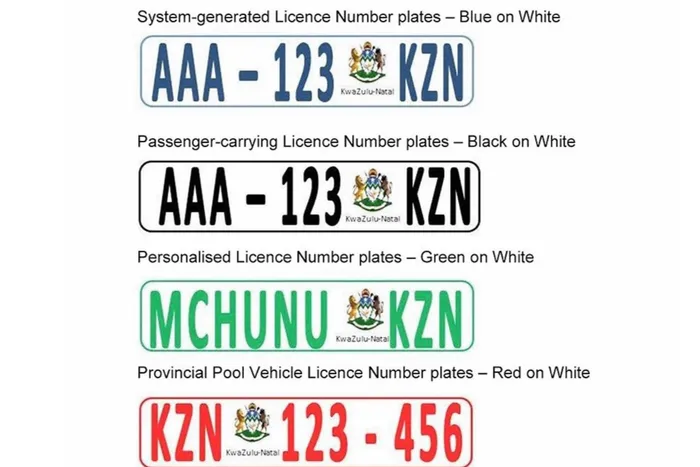
KZN motorists have not been enthusiastic about making the switch to new number plates.
Image: FILE
DURBAN motorists expressed frustration as mandatory number plate changes add financial pressure during already challenging economic times.
Motorists have questioned the timing and necessity of the government initiative, while basic services and infrastructure remain neglected.
This comes as the KwaZulu-Natal Department of Transport (KZN DoT) has urged all motorists in the province to replace their vehicle number plates with the new provincial format by November 30.
The DoT said the transition was necessary because the old town-specific coding system was running out of available number combinations.
The new format - two letters, two digits and two letters followed by “ZN” - was first introduced in December 2023, with a two-year grace period for motorists to migrate.
From December 1, all old-style number plates would be considered invalid under the National Road Traffic Act, and motorists who failed to comply may face fines or other enforcement action.
However, motorists have argued that the migration was an unnecessary financial burden at a time when households were already struggling amid rising living expenses.
Saisha Rathilal, from Phoenix, said: “I want to ask the ANC government why I should spend my hard-earned money on something unnecessary, like changing my car number plates.
“I got my number plate legally, not through bribery or corruption, so why should I change it? My parents told me how the ANC made money off people when the card licences became law. My car is in excellent condition, are the roads in the same excellent condition?
“Where is the Minister of Transport when the taxis hound us for carrying passengers to workers? The rich taxi bosses seem to have the government exactly where they want them,” said Rathilal.
“So I have to ask the Minister of Transport: why are you putting us through so much inconvenience and expense by forcing us to throw away perfectly good number plates? Who will pay me back for the cost of renewing my licence and getting new plates?” she asked.
Saleesha Reddy, of Reservoir Hills, also criticised the timing of the move.
“Honestly, I am really unhappy about this. We are expected to pay for new plates but does the money grow on trees for this?
“That money could go toward groceries, petrol, electricity, and real living expenses. Instead, we are forced to replace plates that are perfectly fine. It is completely unnecessary,” she said.
Roy Naidu, of Tongaat, said: “It feels as if the DoT made this decision without thinking about what it means for the rest of us. Everything is expensive right now, and now we must use money meant for essentials to fix something that is not broken. I do not see the need for this,” said Naidu.
Tevin Muthusamy, of Chatsworth, said he had already complied with the new requirement but believed it should not have been at citizens’ expense.
“I have already changed my plates to avoid compliance issues, but I still feel frustrated. The expense should have been covered by the government. This process was unnecessary, inconvenient, and financially draining. It was a waste of my R350,” he said.
Community activist Roshan Lil-Ruthan said the mandatory change was “an unnecessary financial burden” and questioned the overall coherence of national transport policy.
“At a time when the cost of living is crippling households, the government insists on pushing through a measure that has little to do with road safety or security.
“In the Western Cape, former legislation around number plates has still not been implemented. The yellow plates are still in circulation without issue. Gauteng is introducing QR-coded plates, which OUTA warned would be too costly and could cause motorists to register vehicles outside the province.
“Instead of a uniform national approach, motorists are being forced into costly compliance schemes that look more like revenue generation than safety.
“The real issues, unsafe roads, poor infrastructure, lack of enforcement, remain unaddressed. Ordinary South Africans are footing the bill while politicians enjoy luxury vehicles”, he said.
Lil-Ruthan also pointed to the repeated delays of the AARTO system as evidence of disorganisation in transport policy.
“This constant chopping and changing shows a lack of planning and credibility,” said Lil-Ruthan.
Ish Prahladh, chairperson of the Reservoir Hills Civic Ratepayers Association, said the shortage of available registration numbers was real, but the cost should not fall on the public.
“This change is unnecessary in these trying times, and I agree the municipality should foot the bill, but due to corruption, there is no money,” said Prahladh.
RTI spokesperson, Sindi Msimang said: “All vehicles which do not comply with the new logo and the registration plates of the province will be impounded or be charged according to the AARTO Act. In terms of National Traffic Act, motorists would be charged for not complying with the new number plates that have been prescribed,” said Msimang.